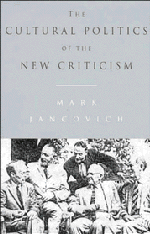Book contents
- Frontmatter
- Contents
- Preface
- List of abbreviations
- Part I The New Criticism and its critics
- 1 Contemporary responses to the New Criticism
- 2 The historical context of the New Criticism
- 3 Before the New Criticism
- Conclusion
- Part II The formation of the New Criticism
- Part III The establishment of the New Criticism
- Part IV The development of the New Criticism
- Conclusion: Modernism and postmodernism within the American academy
- Conclusion
- Notes
- Bibliography
- Index
- Frontmatter
- Contents
- Preface
- List of abbreviations
- Part I The New Criticism and its critics
- 1 Contemporary responses to the New Criticism
- 2 The historical context of the New Criticism
- 3 Before the New Criticism
- Conclusion
- Part II The formation of the New Criticism
- Part III The establishment of the New Criticism
- Part IV The development of the New Criticism
- Conclusion: Modernism and postmodernism within the American academy
- Conclusion
- Notes
- Bibliography
- Index
Summary
If Ransom, Tate and Warren did support a notion of individualism, it was not one defined by the economic relations of bourgeois society. Nor did it define the individual as natural or asocial. On the contrary, they argued that the market destroyed the possibility of genuine individualism. It limited the realm of individual choice and action by defining people as simply producers or consumers. Increasingly, the relations between people were simply economic exchanges. In contrast, they called for an alternative social form in which economic activity was seen as merely a means to an end, and was tempered by other social and cultural values. They referred to this alternative social form as the traditional society, and they did so for two main reasons. The term was not only meant to define this type of society in opposition to modern society, but also to stress that it had a stronger sense of the past. It did not promote some abstract theory of progress, but had come to terms with the ‘burden of the past’. It had developed ways of living which took an account of the material and historical limitations upon human action.
Their literary criticism was also developed in terms of these social criticisms. Literary modernism, they claimed, was a response to this social situation. It was developed in a society where the rationalizing tendencies of industrial capitalism and bourgeois thought created a distinction between thought and feeling, abstract systems and empiricism.
- Type
- Chapter
- Information
- The Cultural Politics of the New Criticism , pp. 29 - 32Publisher: Cambridge University PressPrint publication year: 1993



